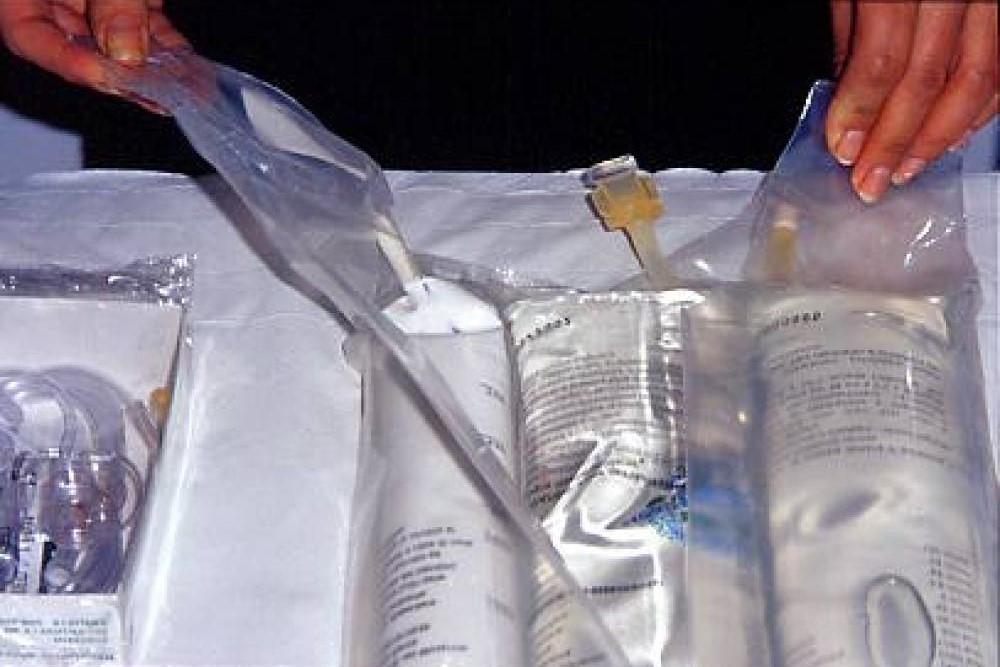
Early Parenteral Nutrition Support Cuts Infections After Major Abdominal Surgery
Early supplemental parenteral nutrition (E-SPN) reduces the risk of infections in hospitalized patients recovering from major abdominal surgery, researchers in China have found
In a multicenter randomized trial, they compared E-SPN initiated on the third day after surgery with late supplemental parenteral nutrition (L-SPN) beginning eight days after surgery
“Early supplemental parenteral nutrition in patients undergoing major abdominal surgery is not as detrimental as many surgeons’ clinical experience suggests,” Dr. Xinying Wang of the Medical School of Nanjing University told Reuters Health by email.
“Our study’s findings are that early initiation of SPN in combination with EN (enteral nutrition) reduces the incidence of nosocomial infection and improves nutritional status (albumin and prealbumin) at discharge, which is consistent with our initial research hypothesis,” said Dr. Wang.
“It’s an enormous encouragement for us because not every clinical study can get the same results as what was initially expected.”
He and his colleagues enrolled patients at 11 tertiary hospitals in China, who were scheduled for a major abdominal surgery and had an anticipated postoperative hospital stay longer than seven days.
Study participants had to be considered at high nutritional risk, with poor tolerance of enteral nutrition, with 30% or less of their daily energy needs from enteral feeding by the second day post-surgery.
The researchers randomly assigned 230 patients to receive either parenteral nutrition E-SPN or L-SPN
Participants’ mean age was 60 and 61% were majority were men. One member of the L-SPN group withdrew their informed consent before nutritional intervention began.
Between days three and seven post-surgery, the E-SPN group had a higher energy intake than the L-SPN group (27 kcal/kg vs. 15 kcal/kg daily, P<0.001).
For this same period, the mean protein intake also favored the early intervention group (1.02 g/kg per day vs. 0.48 g/kg per day, P<0.001).
From days eight to 12 following surgery, no statistical differences were found in either mean energy or mean protein intake between the groups.
Fewer in-hospital or nosocomial infections were documented for the E-SPN group (8.7% vs. 18.4%, P=0.04).
While there was no statistically significant difference for minor infectious complications, major infectious complications such as pneumonia, abdominal infection, septic shock and bloodstream infection were less common in the E-SPN group (7.0% vs. 15.8%; P=0.04).
There were no significant differences between the two groups in the mean number of noninfectious complications, total adverse events, or rates of other secondary outcomes.
Members of the L-SPN group, however, required more time on therapeutic antibiotics (seven vs. six days, P=0.01).
“Going through it, it looks like a nice, valid study,” Dr. Jeffrey Mechanick of Mount Sinai Health System in New York City told Reuters Health by phone.
“I direct metabolic support at Mount Sinai Hospital and I’ve always been a big proponent of early nutrition support.”
Dr. Mechanick emphasized that the benefits of early nutrition support are likely limited to cases of simple malnourishment, as opposed to the more complex and inflammatory cytokine-mediated malnutrition as experienced by many patients in intensive care.
“First of all, (the patients) were malnourished.
Second, this was abdominal surgery. Third, they were doing more modern parenteral nutrition.
They were not overfeeding.
They’re controlling sugars.
So it’s not surprising that they found a benefit,” he said.
“I mean, in a way it’s surprising, because we’ve been waiting for some positive studies to come about.”
Read the publication on parenteral nutrition:
Read Also:
Emergency Live Even More…Live: Download The New Free App Of Your Newspaper For IOS And Android
Intestinal Infections: How Is Dientamoeba Fragilis Infection Contracted?
Paediatrics / Recurrent Fever: Let’s Talk About Autoinflammatory Diseases
Bacteriuria: What It Is And What Diseases It Is Associated With
Naegleria Infection: What It Is And How To Treat It
Contamination Of Materials In A Hospital Environment: Discovering Proteus Infection
MDTHINK – Effective Parenteral Access For Ebola Patients


